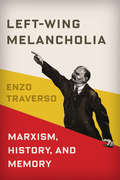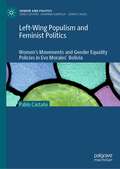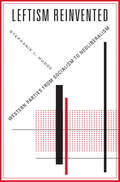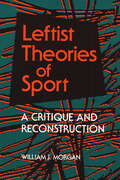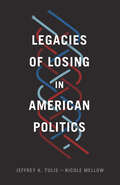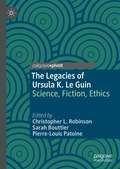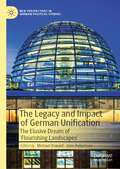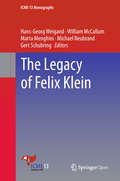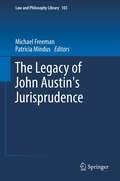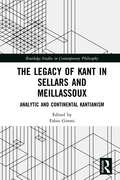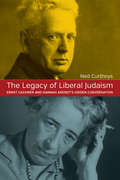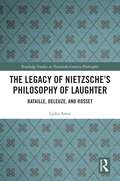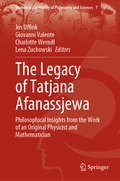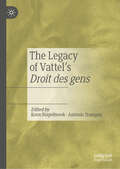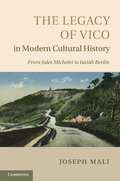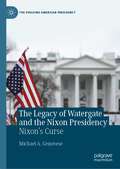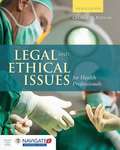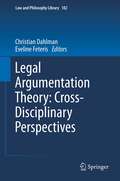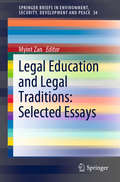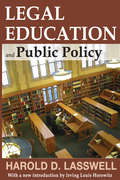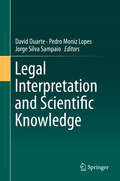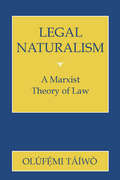- Table View
- List View
Left-Wing Melancholia: Marxism, History, and Memory
by Enzo TraversoThe fall of the Berlin Wall marked the end of the Cold War but also the rise of a melancholic vision of history as a series of losses. For the political left, the cause lost was communism, and this trauma determined how leftists wrote the next chapter in their political struggle and how they have thought about their past since. Throughout the twentieth century, argues Left-Wing Melancholy, from classical Marxism to psychoanalysis to the advent of critical theory, a culture of defeat and its emotional overlay of melancholy have characterized the leftist understanding of the political in history and in theoretical critique.Drawing on a vast and diverse archive in theory, testimony, and image and on such thinkers as Karl Marx, Walter Benjamin, Theodor W. Adorno, and others, the intellectual historian Enzo Traverso explores the varying nature of left melancholy as it has manifested in a feeling of guilt for not sufficiently challenging authority, in a fear of surrendering in disarray and resignation, in mourning the human costs of the past, and in a sense of failure for not realizing utopian aspirations. Yet hidden within this melancholic tradition are the resources for a renewed challenge to prevailing regimes of historicity, a passion that has the power to reignite the dialectic of revolutionary thought.
Left-Wing Melancholia: Marxism, History, and Memory (New Directions in Critical Theory #17)
by Enzo TraversoThe fall of the Berlin Wall marked the end of the Cold War but also the rise of a melancholic vision of history as a series of losses. For the political left, the cause lost was communism, and this trauma determined how leftists wrote the next chapter in their political struggle and how they have thought about their past since. Throughout the twentieth century, argues Left-Wing Melancholia, from classical Marxism to psychoanalysis to the advent of critical theory, a culture of defeat and its emotional overlay of melancholy have characterized the leftist understanding of the political in history and in theoretical critique.Drawing on a vast and diverse archive in theory, testimony, and image and on such thinkers as Karl Marx, Walter Benjamin, Theodor W. Adorno, and others, the intellectual historian Enzo Traverso explores the varying nature of left melancholy as it has manifested in a feeling of guilt for not sufficiently challenging authority, in a fear of surrendering in disarray and resignation, in mourning the human costs of the past, and in a sense of failure for not realizing utopian aspirations. Yet hidden within this melancholic tradition are the resources for a renewed challenge to prevailing regimes of historicity, a passion that has the power to reignite the dialectic of revolutionary thought.
Left-Wing Populism and Feminist Politics: Women’s Movements and Gender Equality Policies in Evo Morales’ Bolivia (Gender and Politics)
by Pablo CastañoThis book investigates the relation between left-wing populism and feminist politics by analysing three specific aspects. First, whether left-wing populist parties promote gender equality policies, against charges of a general inconsistency between both political projects; Second, how do these parties form their policy-making coalitions in the field of gender equality; Third, how much impact on policy do women’s movements have when left-wing populists are in power. The book is focused on the case of Bolivia during the first twelve years of Evo Morales's presidency. The empirical analysis is based on the qualitative content analysis of documents and semi-structured interviews with women’s movements’ activists, policy-makers and experts in women’s movements. The central issue of the book is present throughout the volume, but each empirical chapter can be also read as a semi-autonomous analysis of a specific aspect of the relation between left-wing populism and feminist politics, which increases the interest of the book for different audiences including experts in gender and politics and feminist activists, specialists in Latin American politics, indigenous politics and social movements.
Leftism Reinvented: Western Parties from Socialism to Neoliberalism
by Stephanie L. MudgeLeft-leaning political parties play an important role as representatives of the poor and disempowered. They once did so by promising protections from the forces of capital and the market’s tendencies to produce inequality. But in the 1990s they gave up on protection, asking voters to adapt to a market-driven world. Meanwhile, new, extreme parties began to promise economic protections of their own—albeit in an angry, anti-immigrant tone. To better understand today’s strange new political world, Stephanie L. Mudge’s Leftism Reinvented analyzes the history of the Swedish and German Social Democrats, the British Labour Party, and the American Democratic Party. Breaking with an assumption that parties simply respond to forces beyond their control, Mudge argues that left parties’ changing promises expressed the worldviews of different kinds of experts. To understand how left parties speak, we have to understand the people who speak for them. Leftism Reinvented shows how Keynesian economists came to speak for left parties by the early 1960s. These economists saw their task in terms of discretionary, politically-sensitive economic management. But in the 1980s a new kind of economist, who viewed the advancement of markets as left parties’ main task, came to the fore. Meanwhile, as voters’ loyalties to left parties waned, professional strategists were called upon to “spin” party messages. Ultimately, left parties undermined themselves, leaving a representative vacuum in their wake. Leftism Reinvented raises new questions about the roles and responsibilities of left parties—and their experts—in politics today.
Leftist Theories of Sport: A Critique and Reconstruction (Sport and Society)
by William J. MorganThe degradation of modern sport--its commercialization, trivialization, widespread cheating, cult of athletic stars and celebrities, and manipulation by the media--has led to calls for its transformation. William J. Morgan constructs a critical theory of sport that shores up the weak arguments of past attempts and points a way forward to making sport more humane, compelling, and substantive. Drawing on the work of social theorists, Morgan challenges scholars and fans alike to explore new spaces in sport culture and imagine the rich cultural and political possibilities to be found in the pastimes we follow with such passion.
Legacies of Empire
by Halperin, Sandra and Palan, Ronen Sandra Halperin Ronen PalanThe nation-state is a fairly recent historical phenomenon. Human history over the past two to four millennia has been dominated by empires, and the legacies of these empires continues to shape the contemporary world in ways that are not always recognised or fully understood. Much research and writing about European colonial empires has focused on relations between them and their colonies. This book examines the phenomenon of empire from a different perspective. It explores the imprint that imperial institutions, organisational principles, practices, and logics have left on the modern world. It shows that many features of the contemporary world - modern armies, multiculturalism, globalised finance, modern city-states, the United Nations - have been profoundly shaped by past empires. It also applies insights about the impact of past empires to contemporary politics and considers the long-term institutional legacies of the American 'empire'.
Legacies of Losing in American Politics (Chicago Studies in American Politics)
by Jeffrey K. Tulis Nicole MellowAmerican politics is typically a story about winners. The fading away of defeated politicians and political movements is a feature of American politics that ensures political stability and a peaceful transition of power. But American history has also been built on defeated candidates, failed presidents, and social movements that at pivotal moments did not dissipate as expected but instead persisted and eventually achieved success for the loser’s ideas and preferred policies. With Legacies of Losing in American Politics, Jeffrey K. Tulis and Nicole Mellow rethink three pivotal moments in American political history: the founding, when anti-Federalists failed to stop the ratification of the Constitution; the aftermath of the Civil War, when President Andrew Johnson’s plan for restoring the South to the Union was defeated; and the 1964 presidential campaign, when Barry Goldwater’s challenge to the New Deal order was soundly defeated by Lyndon B. Johnson. In each of these cases, the very mechanisms that caused the initial failures facilitated their eventual success. After the dust of the immediate political defeat settled, these seemingly discredited ideas and programs disrupted political convention by prevailing, often subverting, and occasionally enhancing constitutional fidelity. Tulis and Mellow present a nuanced story of winning and losing and offer a new understanding of American political development as the interweaving of opposing ideas.
The Legacies of Ursula K. Le Guin: Science, Fiction, Ethics (Palgrave Studies in Science and Popular Culture)
by Christopher L. Robinson Sarah Bouttier Pierre-Louis PatoineThe Legacies of Ursula K. Le Guin explores how Le Guin’s fiction and essays have built a speculative ethical practice engaging indigenous knowledge and feminism, while crafting utopias in which human and other-than-human life forms enter into new relations. Her work also delineates new ways of making sense of the “science” of science fiction. The authors of this collection provide up-to-date discussions of well-known works as well as more experimental writings. Written in an accessible style, Legacies will appeal to any readers interested in literature, science fiction and fantasy, as well as specialists of science and technology studies, philosophy of science, ethics, gender studies, indigenous studies and posthumanism.
The Legacy and Impact of German Unification: The Elusive Dream of 'Flourishing Landscapes' (New Perspectives in German Political Studies)
by Michael Oswald John RobertsonOn October 3, 1990 the future of both Europe and Germany became powerfully and inexorably intertwined across a politically broadened continent powering transformative social, political and economic interactions. The thirty year mark after the then reigning chancellor Helmut Kohl promised 'flourishing landscapes' in the former GDR is more than just a new anniversary from which mandatory reflections must follow. Arguably, it represents a temporal boundary between the adjustments and reactions conditioned and captivated by a sense of something new and uncertain, and that point moving forward from which unification’s legacy inescapably tethers Germany’s future to normal politics shaped by the issues of the moment, and not politics gripped by the debates of unification itself. That legacy is defined by an accumulation over thirty years of adjustments, mutations, counter-adjustments and strategic reactions which have now delivered through the many ripples of change a Germany managing the course-trajectory which unification has relentlessly plotted. The foreseeable future will certainly see that legacy of unification tenaciously continue to project yet shrouded within the background of Germany’s routine politics. This volume explores that legacy within the post-unification era and reflects on the way forward into a near-term German future no longer consumed with unification itself but with the reality of politics it has steadily defined.
The Legacy of Felix Klein (ICME-13 Monographs)
by Hans-Georg Weigand William McCallum Marta Menghini Michael Neubrand Gert SchubringThis open access book provides an overview of Felix Klein’s ideas, highlighting developments in university teaching and school mathematics related to Klein’s thoughts, stemming from the last century. It discusses the meaning, importance and the legacy of Klein’s ideas today and in the future, within an international, global context. Presenting extended versions of the talks at the Thematic Afternoon at ICME-13, the book shows that many of Klein’s ideas can be reinterpreted in the context of the current situation, and offers tips and advice for dealing with current problems in teacher education and teaching mathematics in secondary schools. It proves that old ideas are timeless, but that it takes competent, committed and assertive individuals to bring these ideas to life. Throughout his professional life, Felix Klein emphasised the importance of reflecting upon mathematics teaching and learning from both a mathematical and a psychological or educational point of view. He also strongly promoted the modernisation of mathematics in the classroom, and developed ideas on university lectures for student teachers, which he later consolidated at the beginning of the last century in the three books on elementary mathematics from a higher standpoint.
The Legacy of John Austin's Jurisprudence
by Michael Freeman Patricia MindusThis is the first ever collected volume on John Austin, whose role in the founding of analytical jurisprudence is unquestionable. After 150 years, time has come to assess his legacy. The book fills a void in existing literature, by letting top scholars with diverse outlooks flesh out and discuss Austin's legacy today. A nuanced, vibrant, and richly diverse picture of both his legal and ethical theories emerges, making a case for a renewal of interest in his work. The book applies multiple perspectives, reflecting Austin's various interests - stretching from moral theory to theory of law and state, from Roman Law to Constitutional Law - and it offers a comparative outlook on Austin and his legacy in the light of the contemporary debate and major movements within legal theory. It sheds new light on some central issues of practical reasoning: the relation between law and morals, the nature of legal systems, the function of effectiveness, the value-free character of legal theory, the connection between normative and factual inquiries in the law, the role of power, the character of obedience and the notion of duty.
The Legacy of Kant in Sellars and Meillassoux: Analytic and Continental Kantianism (Routledge Studies in Contemporary Philosophy)
by Fabio GironiContemporary interest in realism and naturalism, emerging under the banner of speculative or new realism, has prompted continentally-trained philosophers to consider a number of texts from the canon of analytic philosophy. The philosophy of Wilfrid Sellars, in particular, has proven remarkably able to offer a contemporary re-formulation of traditional "continental" concerns that is amenable to realist and rationalist considerations, and serves as an accessible entry point into the Anglo-American tradition for continental philosophers. With the aim of appraising this fertile theoretical convergence, this volume brings together experts of both analytic and continental philosophy to discuss the legacy of Kantianism in contemporary philosophy. The individual essays explore the ways in which Sellars can be put into dialogue with the widely influential work of Quentin Meillassoux, explaining how—even though their methods, language, and proximal influences are widely different—their philosophical stances can be compared thanks to their shared Kantian heritage and interest in the problem of realism. This book will be appeal to students and scholars who are interested in Sellars, Meillassoux, contemporary realist movements in continental philosophy, and the analytic-continental debate in contemporary philosophy.
The Legacy of Liberal Judaism: Ernst Cassirer and Hannah Arendt's Hidden Conversation
by Ned CurthoysComparing the liberal Jewish ethics of the German-Jewish philosophers Ernst Cassirer and Hannah Arendt, this book argues that both espoused a diasporic, worldly conception of Jewish identity that was anchored in a pluralist and politically engaged interpretation of Jewish history and an abiding interest in the complex lived reality of modern Jews. Arendt's indebtedness to liberal Jewish thinkers such as Moses Mendelssohn, Abraham Geiger, Hermann Cohen, and Ernst Cassirer has been obscured by her modernist posture and caustic critique of the assimilationism of her German-Jewish forebears. By reorienting our conception of Arendt as a profoundly secular thinker anchored in twentieth century political debates, we are led to rethink the philosophical, political, and ethical legacy of liberal Jewish discourse.
The Legacy of Nietzsche’s Philosophy of Laughter: Bataille, Deleuze, and Rosset (Routledge Studies in Twentieth-Century Philosophy)
by Lydia AmirThis book investigates the role of humor in the good life, specifically as discussed by three prominent French intellectuals who were influenced by Nietzsche's thought: Georges Bataille, Gilles Deleuze, and Clément Rosset. Lydia Amir begins by discussing Nietzsche’s reception in France, and she explains why and how he came to be considered a "philosopher of laughter" in the French academe. Each of the subsequent three chapters focuses on the significance of humor and laughter in the good life as advocated by Bataille, Deleuze, and Rosset. These chapters also explore the complex relationship between the comic and the tragic, and of humor and laughter to irony, satire, and ridicule. The Legacy of Nietzsche’s Philosophy of Laughter makes an invaluable contribution to recent interpretive work done on Bataille and Deleuze, and offers further introduction to the relatively understudied Rosset. It illuminates the philosophies of these three thinkers, their connection to Nietzsche, and, overall, the significant role that humor plays in philosophy.
The Legacy of Tatjana Afanassjewa: Philosophical Insights from the Work of an Original Physicist and Mathematician (Women in the History of Philosophy and Sciences #7)
by Jos Uffink Giovanni Valente Charlotte Werndl Lena ZuchowskiThis book presents a collection of essays that explore the life and works of Tatjana Afanassjewa (1876–1964), a Russian–Dutch physicist–mathematician. Readers will discover a scientist whose work on the foundations of thermodynamics significantly influenced the field itself as well as the philosophy of physics. This book highlights the philosophical consequences of her work in physics and mathematics and discusses historical aspects of her writings on the foundations of physics. In addition, it features English translations and critical reviews of key selections from her texts.First and foremost, the book highlights the numerous contributions that Afanassjewa made to the field. In particular, the authors examine her work on the foundations of thermodynamics and statistical physics, starting in the 1920s and extending to 1956, well after the untimely death of her husband in 1933. They also explore her almost entirely forgotten work on the didactics of mathematics. In addition, they discuss her influential collaboration with her husband, the Austrian physicist Paul Ehrenfest (1880–1933).The portrait that emerges is that of a highly original physicist and mathematician, whose legacy continues to influence scientists and philosophers today and whose lesser-known works deserve more attention than they have received. Readers will find a rich body of work that continues to this day to yield insights into the foundations of physics and mathematics.
The Legacy of Vattel's Droit des gens
by Koen Stapelbroek Antonio TrampusThis edited collection offers a reassessment of the complicated legacy of Emer de Vattel’s Droit des gens, first published in 1758. One of the most influential books in the history of international law and a major reference point in the fields of international relations theory and political thought, this book played a role in the transformation of diplomatic practice in the eighteenth and nineteenth century. But how did Vattel’s legacy take shape? The volume argues that the enduring relevance of Vattel’s Droit des gens cannot be explained in terms of doctrines and academic disciplines that formed in the late nineteenth and twentieth centuries. Instead, the chapters show how the complex reception of this book took shape historically and why it had such a wide geographical and disciplinary appeal until well into the twentieth century. The volume charts its reception through translations, intellectual, ideological and political appropriations as well as new practical usages, and explores Vattel’s discursive and conceptual innovations. Drawing on a wide range of sources, such as archive memoranda and diplomatic correspondences, this volume offers new perspectives on the book’s historical contexts and cultures of reception, moving past the usual approach of focusing primarily on the text. In doing so, this edited collection forms a major contribution to this new direction of study in intellectual history in general and Vattel’s Droit des gens in particular.
The Legacy of Vico in Modern Cultural History
by Joseph MaliIn this highly original study Joseph Mali explores how four attentive and inventive readers of Giambattista Vico's New Science (1744) – the French historian Jules Michelet (1798–1874), the Irish writer James Joyce (1882–1941), the German literary scholar Erich Auerbach (1892–1957) and the English philosopher Isaiah Berlin (1909–1997) – came to find in Vico's work the inspiration for their own modern theories (or, in the case of Joyce, stories) of human life and history. Mali's reconstruction of the specific biographical and historical occasions in which these influential men of letters encountered Vico reveals how their initial impressions and interpretations of his theory of history were decisive both for their intellectual development and their major achievements in literature and thought. This new interpretation of the legacy of Vico's New Science is essential reading for all those engaged in the history of ideas and modern cultural history.
The Legacy of Watergate and the Nixon Presidency: Nixon's Curse (The Evolving American Presidency)
by Michael A. GenoveseThis book examines the Nixon presidency, reviews the events surrounding Watergate and the President’ resignation, and unpacks the effects of Watergate on our politics and public attitudes about the political process. Genovese, a prolific scholar of the American presidency who has published three previous books on Nixon and Watergate, argues that the roots of modern political dysfunction and slash-and-burn politics can be traced to the impact of the Vietnam War, the Watergate Crisis, the policies and activities of the Nixon presidency, and the hyper-partisanship they spawned. Now, 50 years on from the scandal, it is time for a reappraisal of Nixon’s impact and a review of the impact he has had on our political system and political culture.
Legal and Ethical Issues for Health Professionals
by George PozgarLegal and Ethical Issues for Health Professionals, Fourth Edition is a concise and practical guide to legal and ethical dilemmas facing healthcare professionals in the real-world today. Thoroughly updated and featuring new case studies, this dynamic text will help students to better understand the issues they will face on the job and the implications in the legal arena. With contemporary topics, real-world examples, and accessible language, this comprehensive text offers students an applied perspective and the opportunity to develop critical thinking skills. Legal and Ethical Issues for Health Professionals provides an effective transition from the classroom to the reality of a clinical environment.
Legal Argumentation Theory: Cross-Disciplinary Perspectives
by Christian Dahlman Eveline FeterisThis book offers its readers an overview of recent developments in the theory of legal argumentation written by representatives from various disciplines, including argumentation theory, philosophy of law, logic and artificial intelligence. It presents an overview of contributions representative of different academic and legal cultures, and different continents and countries. The book contains contributions on strategic maneuvering, argumentum ad absurdum, argumentum ad hominem, consequentialist argumentation, weighing and balancing, the relation between legal argumentation and truth, the distinction between the context of discovery and context of justification, and the role of constitutive and regulative rules in legal argumentation. It is based on a selection of papers that were presented in the special workshop on Legal Argumentation organized at the 25th IVR World Congress for Philosophy of Law and Social Philosophy held 15-20 August 2011 in Frankfurt, Germany.
The Legal Dimensions of Oil and Gas in Iraq
by Rex J. ZedalisThis volume presents the first and only comprehensive examination of the legal issues surrounding international debt recovery on claims against Iraqi oil and gas. In addition to presenting a snapshot view of Iraq's outstanding debt obligations and an analysis of the significance of the theory of odious debt in the context of the Iraqi situation, the list of legal issues examined includes relevant provisions of the Iraqi Constitution of 2005, controlling Security Council resolutions, pertinent articles of the KRG oil and gas law (No. 22) of 2007 and the many nuanced and technical questions raised thereby, legal pronouncements aimed at protecting Iraqi oil and gas and those adopted in selected other nations, and general problems associated with recognition and enforcement of awards or judgments that may involve such oil and gas or revenues from the sale thereof. Also discussed are the lessons learned by the handling of the Iraq debt experience and the transferability of those lessons to future situations in which resource-rich nations may have outstanding financial obligations to other members of the world community or their nationals.
Legal Education and Legal Traditions: Selected Essays (SpringerBriefs in Environment, Security, Development and Peace #34)
by Myint ZanThis book deals with aspects of legal education and legal traditions. Part I includes chapters on teaching Law of the Sea, legal ethics and educating lawyers as ‘transaction cost engineers’ as well as comparison of teaching law in a refugee camp and in a Malaysian University. Part II on legal and philosophical traditions includes essays on what later philosophers would have commented on Plato’s arguments in the Crito regarding ‘absolute obligation to obey the law’ and what Socrates would have said on two conversations in the 19th century novel Uncle Tom’s Cabin regarding the morality and legality of harbouring runaway slaves. Part II concludes with two essays regarding the applicability of the Hart-Devlin debate on the ‘enforcement of morals’ vis-à-vis the International Criminal Court and an essay on what the historian Arnold Toynbee would have commented on the ‘contingency’ v ‘teleology’ debate between two palaeontologists the late Stephen Jay Gould and Simon Conway Morris.• Legal education of interest to legal educators and students • Legal, political, moral philosophy as well as philosophy of history of interest to law, philosophy and history teachers, postgraduate and under graduate students• Aspects of legal ethics for law teachers, students and legal professionals• Interdisciplinary studies regarding law and economics, law and literature, law and social justice for law, humanities, social science academics and students.
Legal Education and Public Policy
by Harold D. LasswellIn spite of a cascade of criticism launched against the social sciences, they have brought a qualitative improvement in method and theory to the study of human beings and human relations. In the process of developing now commonplace foundations of social research few individuals have exercised a greater role in justifying and enriching social scientific thought and practice than Harold D. Lasswell. Originally published in 1945 as The Analysis of Political Behaviour, this extraordinary volume has been re-titled Legal Education and Public Policy. The selections acknowledge Lasswell's growing anxieties about a world of revolution, violence, and terror, and the frailties of law in addressing such matters. That he did so without recourse to vague and fatuous appeals to world law and world order is an indication of how close to empirical realities he remained. Lasswell's essays fuse the legal and moral in the conduct of public policy. This did not deter him from arguing the case for and ultimate benefits of democratic values as a ground for legal thought. Lasswell singles out the interviewing technique of the psychiatrist, what he calls -the insight interview- in many of these essays. The Freudian world opened up the possibilities of analysis to political scientists who, prior to Lasswell, viewed neuroses in the leaders they studied but without normative points to measure their own biases. Lasswell's essays serve as a landmark in accelerating rapid advance in social science research. It allowed for the evolution of political behavior that has catapulted the field to a major dimension of political science studies in leadership and mass persuasion.
Legal Interpretation and Scientific Knowledge
by David Duarte Pedro Moniz Lopes Jorge Silva SampaioThis book discusses the question of whether legal interpretation is a scientific activity. The law’s dependency on language, at least for the usual communication purposes, not only makes legal interpretation the main task performed by those whose work involves the law, but also an unavoidable step in the process of resolving a legal case. This task of decoding the words and sentences used by normative authorities while enacting norms, carried out in compliance with the principles and rules of the natural language adopted, is prone to all of the difficulties stemming from the uncertainty intrinsic to all linguistic conventions. In this context, seeking to determine whether legal interpretation can be scientific or, in other words, can comply with the requirements for scientific knowledge, becomes a central question. In fact, the coherent application of the law depends on a knowledge regarding the meaning of normative sentences that can be classified (at least) as being structured, systematically organized and tendentially objective. Accordingly, this book focuses on analyzing precisely these problems; its respective contributions offer a range of revealing perspectives on both the problems and their ramifications.
Legal Naturalism: A Marxist Theory of Law
by Olufemi TaiwoLegal Naturalism advances a clear and convincing case that Marx's theory of law is a form of natural law jurisprudence. It explicates both Marx's writings and the idea of natural law, and makes a forceful contribution to current debates on the foundations of law. Olufemi Taiwo argues that embedded in the corpus of Marxist writing is a plausible, adequate, and coherent legal theory. He describes Marx's general concept of law, which he calls "legal naturalism." For Marxism, natural law isn't a permanent verity; it refers to the basic law of a given epoch or social formation which is an essential aspect of its mode of production. Capitalist law is thus natural law in a capitalist society and is politically and morally progressive relative to the laws of preceding social formations. Taiwo emphasizes that these formations are dialectical or dynamic, not merely static, so that the law which is naturally appropriate to a capitalist economy will embody tensions and contradictions that replicate the underlying conflicts of that economy. In addition, he discusses the enactment and reform of "positive law"--law established by government institutions--in a Marxian framework.
